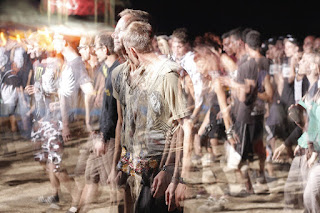Last time at Unchained, I introduced a blog series entitled,
“
Another Civil War in America?” Here is part one. It may be the
longest of these posts, and the subject may bleed into subsequent posts. That’s
because racism, in its post-modern description, filters into every other
subject I’ll address in this series.
PART ONE:
I grew up in the South. Well, in Central Florida, which is
where I still abide. In my growing-up years, our little corner of the U.S.A. became
a melting pot of culture and ethnicity. People from other states and from other
countries settled here. This is definitely not the Deep South, but at one time
it abounded with Southern ideology. That brought with it a line of thinking
rooted in segregation.

Blending cultures was probably as difficult here as it
was anywhere in the South. I never quite latched onto the idea that it was my
privilege as a white person to think less of a person of color, or to avoid
such a person, or to consider that person a lesser creation of the God I was
taught created us all. Fortunately, I didn’t get it.
I was well into adulthood when I saw the change I had longed
for since childhood. The church, at least in my experience, became multi-ethnic
and multi-cultural. And we, at least in my congregation, like it that way. We
are united in Christ. This was an outcome of societal change, which as it turns
out, isn’t all bad. Of course, it was more so the direction of God and good
leaders in the church who brought about the blessing. This is where I find a
little bit of Heaven on Earth. The melding of race and culture within the
church exudes grace. I don’t mean to preach to the choir here, so to speak, but if
your experience in church doesn’t lead you to this conclusion, consider encouraging
a change. Racism is not Christian. It never was. It was social pressure that
marred decades of our history with wrong thinking, and some of it came out of the church, from ordinary people who got a hooked on an bad idea.

But who started it? A pattern of bigotry has always existed. In our country, perhaps that pattern was woven into our fabric, but blame
can’t be assigned to any one group. Historically, the role of Christians in
ending slavery has been allowed to devolve into the notion that it was the
church goers who fought to maintain their way of life in the South. Of course, some
people, fearing change, held on. But anyone understanding the Word of God had
to adjust their mindset in support of freedom for all.
In the generations that
followed, public valuation, fear, and more than a little political rhetoric
clouded the judgment of some. But poor judgment gave way to better ideas,
proper laws, and cultural change.
I know, I’m a white woman living a dream within the safe
walls of my church, where we all get along. Your world might be very different,
and certainly the walls of the church no longer offer safe haven. I’m aware of
the dangers we all face in any public arena. Americans have been set against
each other. A war mentality is already taking root. But how did it happen? And why?
To a degree, slanted reporting and political contention must be blamed. Joe Biden blasted the president for his racist views, accusing
him of encouraging white supremacy and therefore being at least partially responsible
for the mass shooting in El Paso. During his speech, Biden insinuated that poor
kids can be just as smart as white kids. What? Does he believe white kids are
not poor, and poor kids are not white? Doesn’t that make him a racist? Of
course, the situation was tense, and the presidential candidate might have
misspoken. Maybe he just inadvertently said something stupid. But the blunder
won’t be forgotten. Not by me, and probably not by the people affected by the
tragedy.

While denying
citizenship to foreigners is not acceptable, or Biblical for that matter,
keeping the process under control is paramount. Immigration has been an issue
for a while, as previous presidents have noted and met with potential solutions.
Solutions not unlike the ones supported by our current president. Donald Trump
didn’t start this. And he won’t end it, hard as he may try. For now,
maintaining the sovereignty and security of this nation is President Trump’s
duty. That doesn’t make him a white supremacist, as some have proclaimed. Such
unfounded accusations sprout racism anew where it’s long been rooted out.
Studies don’t give a clear answer as to how many white
supremacists live in America, but they’re probably not as numerous as some
would have us believe. The level of intelligence, and the needed finance, wouldn’t
likely come from within their ranks to win a war, or even start one. It’s the
media stirring that cauldron. If a few organized racists find themselves at
war, the brains and money will have come from the outside. But who are these
undercover anti-racist/racist benefactors?
Theories abound as to why anyone would want to start a race
war: The government wants a good excuse to instill martial law. An elite group—the
one that really runs the world— is bent on population control. Some of our elected
officials want a good reason to…I don’t know what they want…but socialism, in
their view, might be just what America needs.
What is racism, or, what did it used to be? Here’s the
definition: prejudice, discrimination, or antagonism
directed against a person or people on the basis of their membership in a
particular racial or ethnic group, typically one that is a minority or
marginalized.
Today, the boundaries of racism have
extended to include not only race, but life choices, sexual and gender
identity, patriotism, political affiliation, environmentalism, immigration, and
religious ideals. Everybody’s got a self-righteous reason to start a riot. But
this kind of social upheaval is nothing new, and it can only get worse.
But mark this:
There will be terrible times in the last days. People will be lovers of themselves,
lovers of money, boastful, proud, abusive, disobedient to their
parents, ungrateful, unholy, without love, unforgiving,
slanderous, without self-control, brutal, not lovers of the good, treacherous, rash,
conceited, lovers of pleasure rather than lovers of God—having a form of
godliness but denying its power. Have nothing to do with such people. 2Timothy 3:1
Now, somebody
will call me a bigot for quoting the Bible. Somebody will assume I’m maligning a particular group, categorizing acceptable people who’ve done nothing wrong.
Go ahead and make your judgment about that. It’s not my desire to do so. As for
having nothing to do with such people, first of all, keep in mind that “the
last days” began with Jesus, and that the letter writer, Paul, was addressing
Timothy, a young preacher of the gospel stationed in a pagan culture not so
different from our world today. Did Paul mean keep your distance, or did
he mean you live holy? Living holy is the greater challenge,
but that’s my choice. I won’t demonstrate hate, but I will follow Christ. And
so, I’ll have nothing to do with what some people do.

That’s
not racist. In fact, it has nothing to do with race. It’s not refusal to dwell
in community with anyone who’s different. It’s not swinging to the Left or to
the Right. It’s just me trying to live holy. I realize that if a race war is
waged, I may be categorized as a probable war starter—white, Southern,
Christian. But don’t buy it. True believers can do nothing but stand against the
evil lies of racism.
Next time: Abortion: A Once Private Decision
that Became a Celebrated National Demand

























